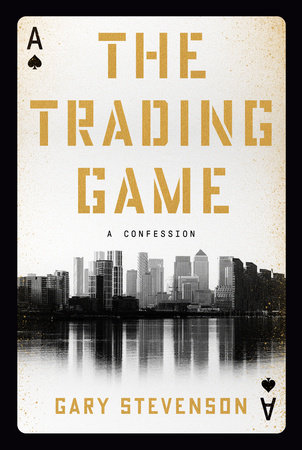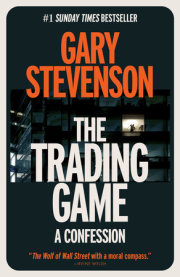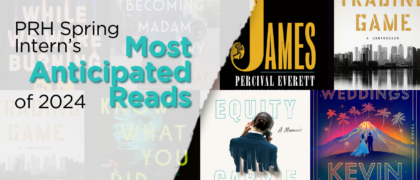1 In some ways, I was born to be a trader.
At the end of the street I grew up on, in front of the tall, concave wall of a recycling center, a lamp post and a telegraph pole stand four meters apart from one another, forming the perfect set of impromptu goalposts.
If you stand between those two posts, take ten big steps backward and stare upward and between them, into the far distance, the light of the tallest Canary Wharf skyscraper will peek over that high wall, and wink at you.
After school, as a child, I would spend long evenings kicking battered foam footballs in and around those goalposts, wearing battered school shoes and my brother’s school uniform. When my mum would come and call me home for dinner, I’d look back and watch that skyscraper wink at me. It seemed to mean some sort of new life.
It wasn’t just the streets of East London I shared with those gleaming, towering temples of capitalism. There was something else too, some kind of shared belief. Something about money. Something about want.
The importance of money, and the knowledge that we didn’t have much of it, was something I always felt deeply. In one of my earliest memories, my parents gave me a pound coin, and sent me to the Esso garage to buy lemonade. At some point in the trip, I dropped that pound coin, and lost it. In my memory, I searched for that pound coin for what seemed like hours—crawling under cars, scrabbling in the drains—before returning home, empty-handed, and in floods of tears. In reality, it was probably only thirty minutes. But thirty minutes is a long time when you’re a child, I guess, and one pound was a lot of money.
I don’t know if I ever really lost that love for money. Although, now, when I look back and think about it, I’m not sure that love is the right word. Perhaps, especially when I was a kid, I think it might have been more of a fear. But whether it was fear, or a love, or a hunger, it only got stronger as I started to grow, and I was always chasing those pounds I didn’t have. At twelve, I started selling penny sweets in school; at thirteen, I started delivering papers, 364 days a year, for £13 a week. By sixteen, my high school sales business had become considerably more adventurous, more profitable, and more illicit. But those small kills were never really the end game, and every evening, after the sun went down, I’d always look up at those skyscrapers, winking down at me from the end of the street.
But there were many other ways in which I was not born to be a trader, and those ways were and are, very important.
Because there are many, many, young, hungry, ambitious boys kicking broken footballs around lamp posts and cars in the shadows of East London’s skyscrapers. Many of them are smart, many of them are committed, almost all of them would make all kinds of sacrifices to put on a tie and some cufflinks and go walk into those tall, shiny towers of money. But if you step onto those trading floors, which take pride of place in those glimmering skyscrapers where young men earn millions of pounds every year in the heart of what was once East London’s docklands, you will not hear the proud accents of Millwall and Bow, of Stepney and Mile End and Shadwell and Poplar. I know, because I worked on one of those trading floors. Someone once asked me where my accent was from. He’d just graduated from Oxford.
The Citibank Tower in Canary Wharf has forty-two floors. In 2006, which was the year I first entered that building, it was the joint second-tallest building in the UK. One day, in 2007, I decided to go up to the top floor of the building, to see what the view was like, and to see if I could see my home.
The top floor of the Citibank Center was used only for conferences and events. This meant that, when it was not in use, the entire space sat totally empty. A vast, uninterrupted country of lush blue carpet, bordered on all sides by thick glass windows. I floated across the soundless carpet to the window, but I couldn’t see the place where I lived. From the 42nd floor of the Citibank Center, you cannot see East London. You can only see the 42nd floor of the HSBC Tower. The ambitious young children of East London look up to the skyscrapers that cast shadows on their houses, but the skyscrapers don’t look back. They look at each other.
This is the story of how I, of all the kids playing football and selling sweets in those shadows, got a job on the Citibank trading floor. It’s a story of how I became Citibank’s most profitable trader, in the whole world, and it’s a story about why, after all of that, I quit.
These were the years when the global economy started to slip off the precipice from which it’s still falling. At times, my sanity slipped with it. At times it still does. God knows, I didn’t treat everyone the best. Harry, Wizard, JB, myself. All the others who really should have had names. I hope you can forgive me for telling your stories. They’re all part of my story, you know?
I’ll dedicate it to Anish’s grandad, who, when we were drunken teenagers, and he was a drunken old man, would mutter to us endlessly the only sentence that he knew well in English.
“Life is life. Game is a game.”
We never really figured out what it meant. I still hope that one day we will.
Copyright © 2024 by Gary Stevenson. All rights reserved. No part of this excerpt may be reproduced or reprinted without permission in writing from the publisher.






